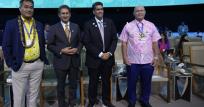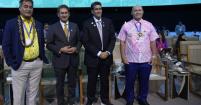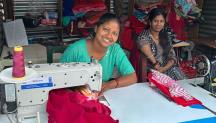

International Collaboration Imperative for Just and Equitable Energy Transition in Small Island Developing States (SIDS)
Newsletter
The IRENA’s World Energy Transition Outlook 2023 (WETO) analysis shows that the current energy transition pledges and plans fall short of the 1.5°C pathway. For the Small Island Developing States (SIDS), the energy transition is not only an answer to the climate emergency, it is a matter of survival.
Opening the high-level event titled "Small Island Developing States: A Just and Equitable Energy Transition towards a Climate-Resilient Future," HE Surangel Whipps Jr, President of Palau, stated: "Access to renewable energy isn't just a luxury but a lifeline that shouldn't come at a cost of a further financial strain. IRENA confirms our fears that the current energy transition efforts fall short of the pathway. For SIDS, the transition to just and equitable energy is not an aspiration but a fundamental need for survival. The stakes are too high, the time too short - we need meaningful action.
SIDS are vulnerable to the effects of climate change due to their special circumstances and are therefore putting just and equitable energy transition targets at the heart of climate ambition and sustainable development. The islands boast one of the most ambitious climate targets. Yet, more than half of the collective renewable energy targeted capacity in SIDS Nationally Determined Contributions (NDCs) is contingent on international support, including financing, technical assistance, technology transfer, and capacity building.
Therefore, recognizing the pivotal role of the international community, SIDS are calling for increased support in scaling up renewables and energy efficiency to unlock the numerous benefits of the energy transition.
The consensus among all speakers was clear – small islands do not contribute to the global emissions in any meaningful way, but they simply carry the burden of climate change. Hon Seve Paeniu, Minister of finance, Tuvalu, painted a grave picture of the island’s reality:
“The situation in Tuvalu is dire and catastrophic. As we sit here, my land is being eaten away, the rising seas are submerging the islands. The crops for which we depend our livelihoods on are being destroyed due to infiltration as sea water coming under ground. Our water access is being compromised. This is our reality in Tuvalu. We are encouraged by the pledges on loss and damaged fund but the issue for us is accessibility to implement solutions.”
The discussion continued with participants underlying the need for streamlined financing and appropriate operationalization of the Loss and Damage Fund. Increased access to financing and capacity support remains essential for the replication and scalability of renewable projects in SIDS and this financing challenge must be overcome. Through its work to date, IRENA and the SIDS Lighthouses initiative have supported SIDS’ climate action efforts through access to finance, capacity building activities, knowledge sharing, technical assistance and tools such as the Solar City Simulator, which ease the implementation of renewables on the ground.
"IRENA supports all SIDS in their energy transition efforts. I invite all islands states and other partners to collaborate in transforming the energy landscape of SIDS,” said Francesco La Camera, IRENA Director-General, in his remarks.
Hon Shawn Edward, Minister of sustainable development, Saint Lucia re-confirmed SIDS’ commitments to renewable-based energy transition. “We stand ready to partner with the international community, together we can transform the energy system and pave the way for a greener future for our planet,” he said.
Norbert Gorissen, Deputy Special Envoy for International Climate Action, Germany confirmed that SIDS have an outstanding role in the energy transition.
“We are not on track to reach the goal of Paris agreement; we need to resolve the crisis on a multilateral level. All emitters must accelerate climate protection and energy transition. We need to triple renewable capacity as proposed by IRENA, but we also need to phase out fossil fuels,” he stated.
The event concluded with a common understanding that achieving climate goals goes beyond commitments. Only real action can accelerate the transition. Hon Kerryne James, Minister of Climate resilience, the Environment and Renewable energy, Grenada captured the event’s main message saying: “Renewable energy is a gift that keeps on giving. Together we can foster a future where islands are not just surviving but are thriving.”




